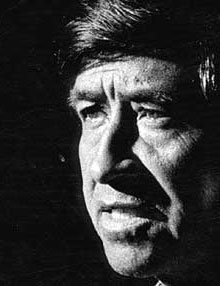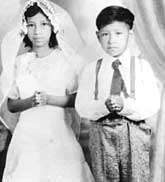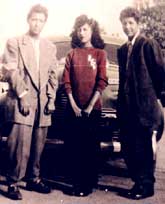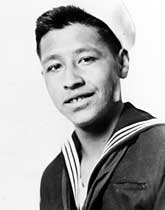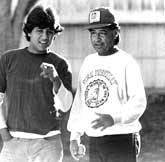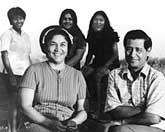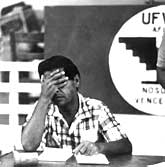 |
|
 |
 |
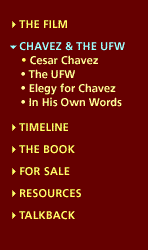 Presented by |
 |
CESAR CHAVEZ
These were difficult years, sleeping by the side of the road, moving from farm to farm, from harvest to harvest. Cesar would attend 38 different schools until he finally gave up after finishing the 8th grade. As Cesar learned the hard lessons of life, he absorbed important values from his parents. His father Librado taught him the value of hard work and opened his eyes to the inequities of the farm labor system. His mother Juana, a deeply religious and compassionate woman, emphasized the importance of caring for the less fortunate, and the power of love. In the early 1940s the Chavez family settled in Delano, a small farm town in the California’s San Joaquin valley, where Cesar would spend his teenage years. In 1946, 17 year-old Cesar Chavez enlisted in the Navy, spending what he would later describe as “the two worst years of my life.” When he got out of the service, he returned to Delano and married his high school sweetheart, Helen Favela. Their relationship, and the support that Helen would give him throughout his life, provided Chavez with the solid base that allowed him to devote his life to helping others.
In San Jose Chavez met a local priest, Father Donald McDonnell, who introduced him to the writings of St. Francis and Mahatma Gandhi, and the idea that non-violence could be an active force for positive change. But he still needed to learn how to put these principles into action. The man who would teach Cesar Chavez how to put theory into practice arrived in San Jose in 1953. Fred Ross was an organizer. He was in San Jose to recruit members for the Community Service Organization. CSO helped its members with immigration and tax problems, and taught them how to organize to deal with problems like police violence and discrimination. To Chavez, Ross’ simple rules for organizing were nothing short of revolutionary. It was the beginning of a life-long friendship between Chavez and Ross. Chavez rapidly developed as an organizer, rising to become the president of CSO. When the organization turned down his request to organize farmworkers in 1962, he resigned and returned to Delano. From 1962 to 1965 he crisscrossed the state, talking to farmworkers. His new organization, the National Farmworkers Association (NFWA), would use the model of community service that Cesar had learned in CSO. Chavez didn’t want to call it a union, because of the long history of failed attempts to create agricultural unions, and the bitter memories of those who had been promised justice and then abandoned. In 1965, the union issue finally exploded. The Agricultural Workers Organizing Committee (AWOC), a mostly Filipino union, struck when the Delano grape growers cut the pay rates during the harvest. Chavez asked his organization to join the strike, and quickly became its leader. The strikers faced odds that could not be overcome by traditional labor tactics. Under Chavez’ leadership, the struggle became defined in new terms. They would do battle non-violently, since they could never match the growers in physical force. They were a poor movement, so they would emphasize their poverty. For many years every organizer and volunteer from Chavez down would be paid room and board and $5 a week. Although there were picket lines in the fields, the real focus moved to the cities where grapes were sold. Hundreds of students, religious workers and labor activists talked to consumers in front of markets, asking them to do a simple thing: “Help the farmworkers by not buying grapes.” At its height, over 13 million Americans supported the Delano grape boycott. The pressure was irresistable, and in 1969 the Delano growers signed historic contracts with the United Farmworkers Organizing Committee, which would later become the United Farmworkers Union (UFW). Chavez had inspired an organization that did not look like a labor union. His vision didn’t include just the traditional bread and butter issues of unionism; it was about reclaiming dignity for people who were marginalized by society. What had started as the Delano grape strike came to be known as La Causa, the Cause. Whether they were farmworkers fighting for a better life, or middle class students trying to change the world, those who were drawn to the farmworkers movement were inspired by Chavez’ example to put aside their normal lives and make exceptional sacrifices. Chavez placed harsher demands on himself than on anyone else in the movement. In 1968 he fasted (the first of several fasts over his lifetime), to recommit the movement to non-violence. In many ways the fast epitomized Chavez’s approach to social change. On one level it represented his spiritual values, his willingness to sacrifice and do penance. At the same time, he and his lieutenants were extremely aware of the political ramifications of his actions, using the fast as a way of both publicizing and organizing for their movement. Fasting was just one expression of his deep spirituality. Like most farmworkers, Chavez was a devout Catholic. His vision of religion was a progressive one, that prefigured the “preferential option for the poor” of liberation theology. In the UFW, the mass was a call to action as well as a rededication of the spirit.
Over the years the UFW would become a significant political force, demonstrating that Mexican Americans could and would participate in electoral politics when their concerns were at stake. Chavez’ understanding of the relationship between economic issues and political participation was the starting point for a growing wave of Latino activism and electoral activity, that would eventually lead to the election of thousands of Latino officials and a major shift in the American political landscape. Chavez had never expected that victory in the battle for farmworkers’ rights would be achieved during his lifetime. In fact, the first stunning victories in the grapes were followed by major setbacks. First in the lettuce industry, and then when the grape contracts expired in 1972, growers sought out the powerful Teamsters Union, and signed contracts with them that rolled back the UFW's hard fought gains. The UFW responded with strikes that led to the jailing of thousands. Many strikers were injured by violent attacks on the picket lines, and two were killed in dreveby shootings and attacks.. But the “inter-union” battle had left the public confused and made a new boycott against lettuce and grape growers difficult. Chavez looked for a political solution to the impasse. He supported Jerry Brown’s bid to become governor of California, and in return was able to engineer the nation’s first law giving farmworkers the right to union elections. The passage of the Agricultural Labor Relations Act in 1975 led to an overwhelming series of UFW election victories, and it seemed that Chavez had finally achieved his goal of organizing farmworkers. The UFW had given up the boycott in exchange for the right to union elections. But relying on the law became uncertain, as growers learned to use it to delay signing contracts. After early successes under the farm labor law, Chavez pulled back from organizing, although he continued to travel extensively to promote awareness of the farmworkers struggle. The election of a Republican governor in 1982 made enforcing the law even more difficult. Chavez’ goals and vision were changing as well. He began to focus on the dangers of pesticides, which had always been a major source of illness among farmworkers. It was a subject that drew a positive response from an environmentally conscious public. Instead of using volunteers, he relied more and more on direct mail. He built low-cost housing for farmworkers, and considered starting an urban organizing campaign in Mexican-American communities. He became interested in modern management techniques and group dynamics, including the group therapy techniques of Synanon, a drug rehabilitation program. 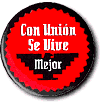 Although questions were raised about his effectiveness in later years, Cesar Chavez had become a remarkable symbol — for Latinos, community activists, the labor movement, young people, and all who valued his values and commitment. He had accomplished something that no one else had ever been able to do; build a union for farmworkers. In the process he trained a generation of activists who would apply their skills in other communities and struggles.
Although questions were raised about his effectiveness in later years, Cesar Chavez had become a remarkable symbol — for Latinos, community activists, the labor movement, young people, and all who valued his values and commitment. He had accomplished something that no one else had ever been able to do; build a union for farmworkers. In the process he trained a generation of activists who would apply their skills in other communities and struggles.Cesar Chavez died in Yuma Arizona on April 23, 1993, near his birthplace in Yuma, Arizon. He was 66 years old. His funeral in Delano attracted thousands of Americans from all walks of life. Years before his death, Chavez was asked by a union member if he wanted to be remembered by statues and public memorials. Chavez replied, “If you want to remember me, organize!” The UFW | Cesar Chavez Elegy | His Own Words | Timeline |
 |
Home | The Film | Chavez & UFW | Timeline | The Book | For Sale | Resources | Talkback |
||
© Copyright 2004. Paradigm Productions and Independent Television Service (ITVS). All Rights Reserved.
